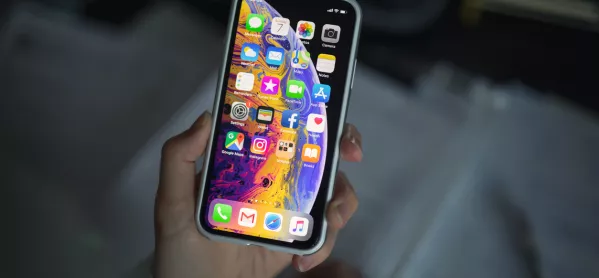Headteachers have called on parents and carers to be mindful of the risks for children associated with the use of electronic devices.
The NAHT heads’ union has issued guidance for families considering an internet-enabled device as a gift for their children this Christmas and urged schools, families and tech companies to act as a “human firewall” around children.
View: Googling could endanger reading ability, head warns
Read: ‘There’s only so much teachers can do about online safety’
Cyberbullying: Social media firms warned over ‘alarming’ bullying rise
Paul Whiteman, general secretary of NAHT, said: “Totally unsupervised use, especially for younger or first-time users is not recommended.
“Families should avoid ‘leaving children to their own devices’. Parents and carers should be aware of what they are viewing and who they are interacting with.
“We would never suggest that parents completely avoid buying smartphones, tablets or games consoles but we would urge them to think carefully about the right gift for their child and to talk to them about what boundaries and permissions will be set.”
Drafted in cooperation with charity Childnet International, the guidelines cover five actions and encourage parents to supervise children while they use their internet-enabled device and to have open and honest conversations about technology.
The association decided to make the appeal in time for families’ Christmas shopping, aware that many parents say they feel uncertain about how best to support their children when it comes to technology.
As for schools, NAHT is not calling for smartphones to be banned, but said a whole-school approach to the sensible and safe use of technology is crucial.
Protected time in the curriculum for PSHE is also a good way to ensure students receive the education they need to become informed and confident users of technology, the association says. It argues this is particularly important that schools help pupils understand what to do if they are exposed to inappropriate or harmful content.
NAHT’s guidance for families
- Make sure your children feel confident they can come to you if they need help or are unsure about anything that happens online.
- Have open and open regular conversations with your children about technology and their use of it. Agree a set of family rules, including around screen time.
- Check the capabilities of the devices your child uses including toys. Does it have internet access? Can it be used to communicate with others?
- Be aware of and follow the age requirements of many social media apps and services, as well as games.
- Help your child get started. Find out what safety tools or parental controls are available, and how they work and set them up as appropriate. For younger children, supervise their use.
Mr Whiteman said: “Schools offer guidance for pupils about staying safe online during lessons like PSHE. But the chance for children to see something they shouldn’t is still there, which is why parents and carers must be involved.
“Tech companies, families and schools can form a ‘human firewall’ around young people, but only if they are proactive.
“We want young people to be informed consumers of this technology, safe enough to surf the internet without fear and smart enough to know what to do if they see inappropriate content.”
Last week, the headteacher of Michaela Community School in London, Katharine Birbalsingh, said the government should ban the use of phones in schools as they pose a threat comparable to alcohol and cigarettes.
She lamented the fact that phones expose children to harmful content and damage their attention span.
“The government should act on this in the same way that the government would never tolerate a school that allowed children to drink alcohol,” she told the i newspaper.





